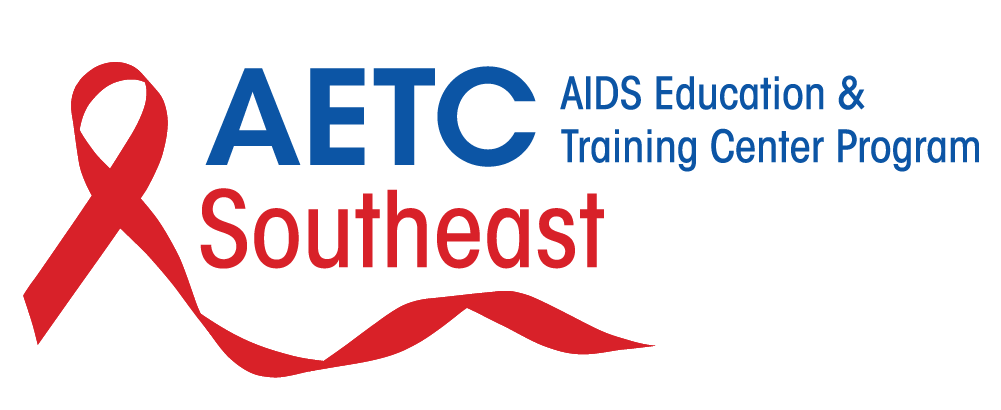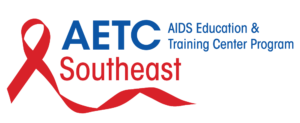Southeast HIV Accelerated Response for Ending the Epidemic Project (SHARE)

Overview:
The goal of this curriculum is to help increase or implement HIV Testing and PrEP prescribing, decrease HIV stigma and increase cultural humility in healthcare settings, and to train staff on HIV topics that may be relevant to their role.
Course Instructors
Sonya O. Brown-Boyne, MACP, LMHC
Adjunct Instructor
Trinity International University – Florida
Vickie Lynn, PhD, MSW, MPH
University of South Florida
School of Social Work
College of Behavioral and Community Sciences
Janet M. Turan, PhD MPH
School of Public Health
Center for AIDS Research (CFAR)
University of Alabama at Birmingham
AETC SHARE Project
Sarit A. Golub, PhD, MPH
Professor of Psychology
Hunter College and Graduate Center | City University of New York, Department of Psychology
William Hight, PhD
Licensed Psychologist, Clinical Professor, Dept. of Psychiatry and Health Behavior, Medical College of Georgia, Augusta University
Consultant Faculty, SE-AETC
James W. Galbraith, MD
Associate Professor
Department of Emergency Medicine
University of Mississippi Medical Center
Sean Kelly, MD
Medical Director, Vanderbilt Comprehensive Care Clinic
Vanderbilt Division of Infectious Diseases
Sensitivity in Care: Avoiding Common Stigmatizing Mistakes
Objectives:
- To identify stigma, stigma drivers, and manifestations
- To understand HIV-related stigma through the scope of the socio-ecological model of health
- To develop action steps to reduce HIV-related stigma using the socio-ecological model of health
Duration: 1:17:00
Why Language Matters: Facing HIV Stigma in Our Own Words
Objectives:
- Understand how language, both verbal and written, impacts stigma and discrimination for people living with HIV
- Recognize the differences between stigmatizing and empowering language, as well as the importance of people first language
- Develop strategies that increase the use of preferred language in both written and verbal forms of communication. Including notes in client charts.
Duration: 41:51
Understanding and Addressing Stigma in Healthcare Settings
Objectives:
- Define types and dimensions of stigma.
- Explain how HIV-related and intersectional stigma experienced by clients can affect HIV prevention and treatment behaviors, as well as health outcomes.
- Identify the variety of interventions and tools that can be used in healthcare settings to reduce stigma.
- Describe the Finding Respect and Ending Stigma around HIV (FRESH) intervention methods and pilot results.
Duration: 33:50
 GOALS: Approach to Sexual History and Health
GOALS: Approach to Sexual History and Health
Objectives:
- Recognize the differences between patient and provider goals for sexual health conversations
- Identify missed opportunities for sexual health conversations and relationship building
- Define the GOALS Approach to taking a sexual history
- Describe how the GOALS Approach can increase utilization of sexual health testing, treatment, and interventions
Duration: 51m
 Providing HIV Test Results
Providing HIV Test Results
Objectives:
- Identify 3 important steps in preparing to deliver HIV test results
- Identify 3 considerations in delivering HIV test results with compassion
- List 3 pieces of information to cover with clients who have reactive HIV test results
Duration: 49m
HIV Testing
Objectives:
- Understand why Universal HIV Testing is important for HIV Prevention
- Understand why stigma is frequently a barrier to HIV Testing
- Learn other challenges to HIV Testing
- Understand the difference between Opt-In and Opt-Out HIV Testing
- Learn about the CDC HIV Screening Guidelines in Healthcare Settings
- Understand available testing assays for HIV
- Learn three methods of HIV Testing
Duration: 18m
Sensitivity in Care: Avoiding Common Stigmatizing Mistakes
Objectives:
- To identify stigma, stigma drivers, and manifestations
- To understand HIV-related stigma through the scope of the socio-ecological model of health
- To develop action steps to reduce HIV-related stigma using the socio-ecological model of health
Duration: 1:17:00
Why Language Matters: Facing HIV Stigma in Our Own Words
Objectives:
- Understand how language, both verbal and written, impacts stigma and discrimination for people living with HIV
- Recognize the differences between stigmatizing and empowering language, as well as the importance of people first language
- Develop strategies that increase the use of preferred language in both written and verbal forms of communication. Including notes in client charts.
Duration: 41:51
Understanding and Addressing Stigma in Healthcare Settings
Objectives:
- Define types and dimensions of stigma.
- Explain how HIV-related and intersectional stigma experienced by clients can affect HIV prevention and treatment behaviors, as well as health outcomes.
- Identify the variety of interventions and tools that can be used in healthcare settings to reduce stigma.
- Describe the Finding Respect and Ending Stigma around HIV (FRESH) intervention methods and pilot results.
Duration: 33:50
 GOALS: Approach to Sexual History and Health
GOALS: Approach to Sexual History and Health
Objectives:
- Recognize the differences between patient and provider goals for sexual health conversations
- Identify missed opportunities for sexual health conversations and relationship building
- Define the GOALS Approach to taking a sexual history
- Describe how the GOALS Approach can increase utilization of sexual health testing, treatment, and interventions
Duration: 51m
 Providing HIV Test Results
Providing HIV Test Results
Objectives:
- Identify 3 important steps in preparing to deliver HIV test results
- Identify 3 considerations in delivering HIV test results with compassion
- List 3 pieces of information to cover with clients who have reactive HIV test results
Duration: 49m
HIV Testing
Objectives:
- Understand why Universal HIV Testing is important for HIV Prevention
- Understand why stigma is frequently a barrier to HIV Testing
- Learn other challenges to HIV Testing
- Understand the difference between Opt-In and Opt-Out HIV Testing
- Learn about the CDC HIV Screening Guidelines in Healthcare Settings
- Understand available testing assays for HIV
- Learn three methods of HIV Testing
Duration: 18m
Course Instructors
Sonya O. Brown-Boyne, MACP, LMHC
Adjunct Instructor
Trinity International University – Florida
Vickie Lynn, PhD, MSW, MPH
University of South Florida
School of Social Work
College of Behavioral and Community Sciences
Janet M. Turan, PhD MPH
School of Public Health
Center for AIDS Research (CFAR)
University of Alabama at Birmingham
AETC SHARE Project
Sarit A. Golub, PhD, MPH
Professor of Psychology
Hunter College and Graduate Center | City University of New York, Department of Psychology
William Hight, PhD
Licensed Psychologist, Clinical Professor, Dept. of Psychiatry and Health Behavior, Medical College of Georgia, Augusta University
Consultant Faculty, SE-AETC
James W. Galbraith, MD
Associate Professor
Department of Emergency Medicine
University of Mississippi Medical Center
Sean Kelly, MD
Medical Director, Vanderbilt Comprehensive Care Clinic
Vanderbilt Division of Infectious Diseases
